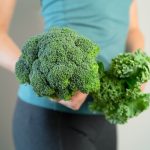Protect your heart: How vitamin K2 alters the health of your arteries
 (NaturalHealth365) Heart disease is the leading cause of death worldwide, claiming around 18 million lives annually – a number expected to rise to 23.3 million by 2030. Atherosclerosis, the buildup of calcified deposits in arteries, has long been recognized as a major contributor to this epidemic. Yet, exciting new research sheds light on the role of vitamin K2, a nutrient often overlooked, in promoting heart health.
(NaturalHealth365) Heart disease is the leading cause of death worldwide, claiming around 18 million lives annually – a number expected to rise to 23.3 million by 2030. Atherosclerosis, the buildup of calcified deposits in arteries, has long been recognized as a major contributor to this epidemic. Yet, exciting new research sheds light on the role of vitamin K2, a nutrient often overlooked, in promoting heart health.
Vitamin K2 deficiencies can set the stage for fatal heart disease
Vitamin K, essential for the proper clotting of blood and maintaining bone density, exists in two forms: vitamin K1 – also known as phylloquinone – and Vitamin K2, or menaquinone. Vitamin K2, in turn, has different forms that have been used in studies – with the MK-4 and MK-7 forms most commonly utilized.
Research has shown that vitamin K1 and vitamin K2 perform different functions. K1 plays a key role in blood clotting and coagulation, while K2 helps to regulate the levels and location of calcium in the body.
It is interesting to note that low levels of K2 are linked with an increased risk of atherosclerosis, the buildup of calcium-containing plaque in the arteries. Calcified arteries greatly increase the risk of heart disease, stroke, heart attack, dementia, and premature death.
This is where vitamin K2 can come to the rescue.
Vitamin K can block harmful calcium infiltration
Both animal and clinical studies have shown vitamin K’s beneficial effects on arteries.
Researchers have discovered that vitamin K2 helps block calcification and arterial sclerosis by binding to calcium. This enhances the body’s ability to store calcium in the bones and prevents it from infiltrating soft tissues and arteries.
In one study, daily consumption of more than 32 micrograms of dietary vitamin K2 reduced the risk of arterial calcification and death from heart disease – by an incredible 50 percent.
An additional observational study confirmed the potentially lifesaving effects of vitamin K2. The research showed that participants with the highest vitamin K2 intake were 52 percent less likely to develop calcification of the arteries and 57 percent less likely to die from heart disease over a 7 to 10-year interval.
In fact, scientists have even worked out a formula identifying the benefits of K2. For every 10 micrograms of vitamin K2 ingested, there is a 9 percent reduction in the risk of heart disease.
More good news: Vitamin K2 can help reverse arterial stiffness
One of the dangers of arterial calcification is that it causes arteries to become stiff and brittle, making it harder for the heart to pump blood – and raising blood pressure. In addition to preventing this condition, vitamin K2 may even be able to help reverse it.
An animal study showed that high amounts of vitamins K1 and K2 reduced previously accumulated arterial calcification by 37 percent after six weeks. After twelve weeks, the reduction was an amazing 53 percent.
The group taking high amounts of vitamin K2 group also had reversals in carotid artery stiffness.
In a 2015 study published in the Journal of Thrombosis and Haemostasis involving 244 postmenopausal women aged 55 to 65, those receiving 180 micrograms a day of vitamin K2 (MK-7 form) for three years experienced a significant reduction in arterial stiffness, while the women who had not received the vitamin saw an increase in stiffness.
The team reported that participants who had a higher degree of arterial stiffness at the beginning of the study tended to enjoy a greater benefit than those with less advanced atherosclerosis.
Optimizing levels of vitamin K can provide important health benefits
You can increase dietary levels of vitamin K1 by eating organic cruciferous vegetables such as kale, broccoli, and Brussels sprouts and by drinking green tea.
While vitamin K1 is found in plant-based foods, Vitamin K2 occurs in animal foods – such as cheese and egg yolks – and fermented foods.
Vegetarians can raise vitamin K2 levels with natto, a fermented soybean dish. But, be warned, strongly-flavored natto is most certainly an acquired taste.
Supplementation could be a wise choice when it comes to raising vitamin K levels. Many holistic healthcare providers suggest that people supplement with three different forms of vitamin K: vitamin K1 and the two forms of vitamin K2 (MK-4, or menaquinone-4, and MK-7, or menaquinone-7).
And, yes, the supplements should be taken with a meal containing healthy fat for better absorption.
Naturally, it’s best to consult a knowledgeable physician who can advise you on the proper amount.
Bottom line: the calcium-binding properties give this vital nutrient the ability to protect against common degenerative diseases. For example, in addition to lowering your odds of atherosclerosis and life-threatening heart disease, optimal levels of vitamin K can reduce the risk of osteoporosis – quite a substantial pay-off for an inexpensive supplement to provide.
Sources for this article include:



